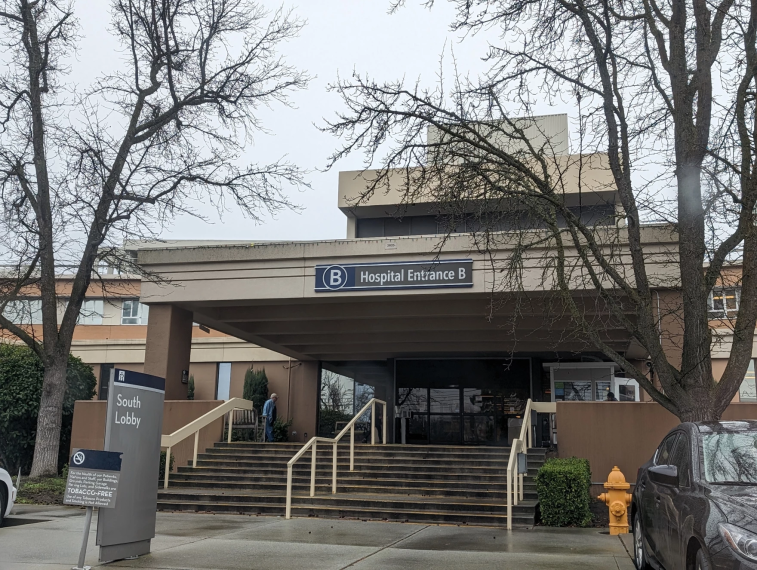Medford, OR — A civil lawsuit seeking over $116 million in damages has been filed against Asante Rogue Regional Medical Center and former nurse Dani Marie Schofield, adding to the growing list of legal challenges facing the hospital amid serious allegations of drug diversion. The case, which accuses Schofield of malpractice, personal injury, and wrongful conduct, is currently in a phase of procedural delays, with efforts to serve the lawsuit paperwork to Schofield being met with significant obstacles.
The lawsuit was initiated by Candi Kay Palomares, a 62-year-old Medford woman, who claims she was the victim of negligence and malpractice during her hospitalization at Asante in March 2023. Palomares had been admitted with severe respiratory distress, and Schofield, who worked as her nurse, is named as a defendant in the case. Court filings reveal that Palomares’ treatment was allegedly compromised due to Schofield’s actions, which are tied to broader accusations of drug diversion involving fentanyl at the hospital.
Schofield, 36, is at the center of a criminal investigation and has been indicted on 44 felony assault charges for allegedly diverting liquid fentanyl from Asante ICU patients, including Palomares. The indictment accuses Schofield of stealing the powerful pain medication for her personal use and replacing it with hospital tap water, leading to infections and complications in patients who received the tampered drugs. While Schofield has pleaded not guilty to the criminal charges, the case has prompted several civil suits against both Schofield and Asante.
Palomares’ lawsuit is one of at least four civil claims filed against Asante in connection with the fentanyl diversion scandal. Two of these lawsuits also name Schofield as a defendant, underscoring the widespread nature of the alleged misconduct. The hospital, which is facing mounting legal scrutiny, has also filed court documents to amend its defense strategy, seeking to be listed as a third-party plaintiff in the largest case, and to formally add Schofield as a third-party defendant.
Despite the severity of the accusations, Palomares’ legal team has encountered difficulties in delivering the lawsuit paperwork to Schofield. Court records show that, although the lawsuit was filed in September 2024, efforts to serve Schofield have been unsuccessful. In early November, the court issued a “Notice of Rule 7,” warning that the case could be dismissed unless proof of service could be provided for all defendants. The rule stipulates that claims against unserved defendants will be dismissed after 28 days unless good cause for the delay is shown.
In response, Palomares’ attorney, Bruce Nishioka, has filed multiple motions requesting an extension to complete the service process. Nishioka’s filings highlight the extensive efforts made to locate and serve Schofield at three different addresses, including her rural home in northern Eagle Point. Photographs submitted to the court show a gate blocking access to Schofield’s property, further complicating the process. Attempts to deliver the lawsuit to her former Medford residence were also unsuccessful, as the house was reportedly up for sale and the door locked.
As the 28-day deadline to prove service expired, Nishioka requested a 90-day extension to allow more time to complete the legal requirements. On December 12, 2024, the court granted the extension, providing Nishioka and his team additional time to locate Schofield and deliver the necessary legal documents.
The ongoing criminal case against Schofield has also had an impact on the civil litigation. Because of the parallel criminal proceedings, Palomares’ civil case, along with others, has been temporarily put on hold. Schofield’s criminal case, which is set to continue with a hearing on December 30, 2024, will likely play a significant role in the progression of the civil lawsuits. The Jackson County District Attorney’s office is investigating the deaths of 16 patients, although investigators have not conclusively linked their deaths to the fentanyl diversion.
Schofield, who spent a week in jail in July 2024 before posting a $4 million bail, faces a lengthy legal battle. The outcomes of her criminal case are expected to have a direct bearing on the civil lawsuits, including Palomares’ claim, which alleges that Schofield’s actions caused significant harm.
The legal storm surrounding Asante continues to build, as multiple plaintiffs come forward with claims of malpractice, negligence, and wrongful death related to the fentanyl diversion. In addition to Palomares’ case, three other civil lawsuits have been filed against Asante, with one seeking over $300 million in damages for a group of 20 plaintiffs. Another lawsuit, filed by the estate of Horace Earl Wilson, demands $11.4 million in damages. Lawyers for the plaintiffs argue that Asante failed to properly supervise its staff and prevent the diversion of controlled substances.
Asante has not commented directly on the ongoing litigation but has made court filings to protect its interests, including the request to amend its defense and include Schofield as a third-party defendant. The medical center’s legal team may be preparing for an extended court battle, as the multiple lawsuits indicate a broad pattern of alleged negligence and criminal activity within its ranks.
As the legal proceedings unfold, both the criminal charges against Schofield and the civil lawsuits against Asante are poised to set significant precedents for how healthcare institutions handle allegations of drug diversion and medical malpractice. With the 90-day extension in place for serving Schofield, the case is expected to progress slowly but steadily. The outcome of these proceedings will likely have far-reaching implications for both the medical community and the victims seeking justice.

